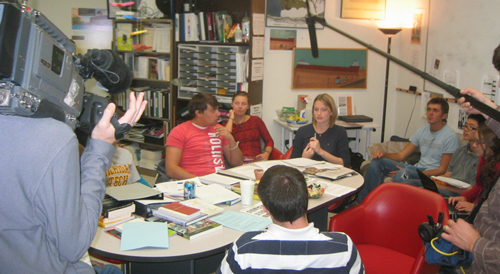Leadership Planning Meeting: 10/03
There just happened to be a film crew in town.

There just happened to be a film crew in town.

We are a group of MTU students currently exploring the feasibility of establishing the Terra Preta @ MTU Project as an Enterprise team or affiliating it with existing campus projects and initiatives. The impetus and commitment remain that the project is a reciprocal project with the local community, with shared access to resources, planning, and participation.
We currently think of terra preta, or terra preta de indio as a framework for exploring the historical, archeological, anthropological, scientific, and indigenous aspects of “dark earth.” We think of biochar as a process and product that may be used as a soil amendment; that it may help increase soil fertility dramatically; and that it may help mitigate climate change via its carbon-negative sequestration qualities.
If you are interested in joining this university and community effort — as a community member, as a student, staff, or faculty member — write to Lydia and we will add you to our biochar-l mailing list and update you on future plans.
Contextualizing 880%
The number that tends to attract attention, inspire both optimism and skepticism, and send us all to our libraries, labs, and greenhouses is the preliminary data provided by Christoph Steiner:

That research is reported in Amazonian Dark Earths: Explorations in Space and Time (2004; p. 191) and more recently, in Slash and Char as Alternative to Slash and Burn (2007 ; p. 61). If you’re on or near the Michigan Tech campus, a copy of Slash and Char is available for review in 112 Walker Arts & Humanities.
As the Terra Preta @ MTU Working Group uses the fall semester to develop a mission and a research scope, and to build local community alliances, we focus on data and hypothesis such as Steiner’s to help frame a series of questions and projects:
We currently think of terra preta, or terra preta de indio as a framework for exploring the historical, archeological, anthropological, scientific, and indigenous aspects of “dark earth.” We think of biochar as a process and product that may be used as a soil amendment; that it may help increase soil fertility dramatically; and that it may help mitigate climate change via its carbon-negative sequestration qualities.